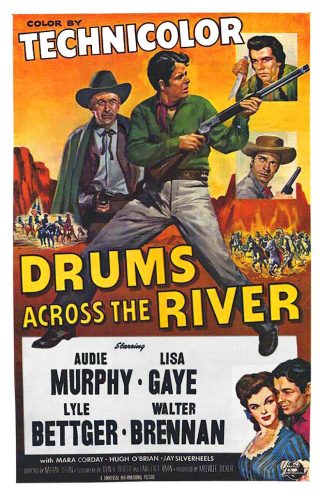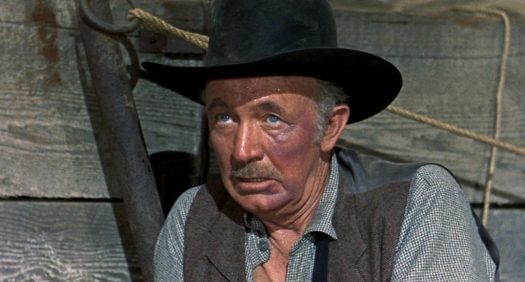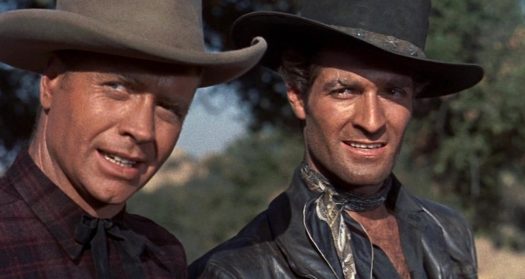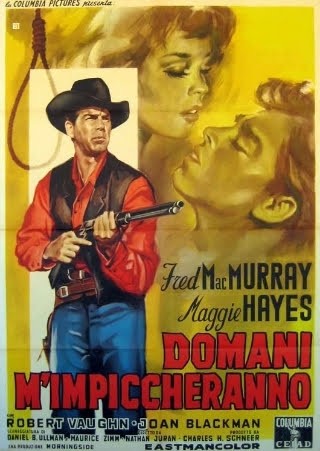Revisiting Universal-International westerns is never a chore. While some are undoubtedly more challenging and engaging than others, there is a strong and distinctive visual aesthetic to them all. Add in the polish and pace of a well-oiled production system and there is usually much to savor. Drums Across the River (1954) was the last of three movies Audie Murphy made for director Nathan Juran and it is an enjoyable picture that blends a number of worthwhile themes into the action, although one could argue that there are too many of those themes for a sub-80 minute movie, too many to do full justice to at any rate.
Gary Brannon (Audie Murphy) and his father Sam (Walter Brennan) run a freight business in Colorado, one which is beginning to feel the pinch economically as the mines that had previously been the life blood of Crown City are yielding less and less. Desperate men naturally snatch at whatever straws of hope appear before them and in this case it is the neighboring land occupied by the Ute tribe, land which is known to be rich in gold reserves. This presents the main source of potential conflict in the movie and it is here that we dive into the action as Gary Brannon is about to defy his father and take part in an excursion onto Ute territory organized by Frank Walker (Lyle Bettger). Walker fully expects to encounter trouble, in fact he welcomes and pushes for it as his ultimate goal is to provoke a war with the Utes that will force the army to intervene and deliver the gold into his hands. Well, a skirmish does occur, despite the best efforts of Brannon Sr to broker peace, and the taking of captives by both sides means an exchange is going to have to take place.
It is at this point that another source of conflict arises, one that is crammed with potential. Sadly, this is only partially fulfilled though, as the fact that Gary’s mother was killed by a Ute warrior in the past comes to light. This explains his hatred for the Indians and introduces a needling note between father and son since the older man has come to terms with his loss and grown to respect the tribe and the Chief (Morris Ankrum) who atoned for the killing at great personal expense. The exchange, negotiated by Gary as his father is nursing a wound, sees him alter his perspective and thus the ethical and philosophical sea-change he experiences is effected a little too quickly and too soon. That is not to say it is unconvincing, merely that it robs the picture of the opportunity to delve deeper into a strong and involving theme. What follows is more standard albeit entertaining fare as the focus shifts to a more direct confrontation between Walker and Brannon Jr, where the former is increasingly determined to remove the stone in his shoe that the latter now represents. As such, we get kidnapping, blackmail and a frame-up all interspersed with copious action sequences as we wind our way towards a satisfying if not altogether unexpected conclusion.
Westerns that lean heavily on subterfuge as plot devices need the right people in the villainous roles. Under the circumstances, it is hard to think of anyone better suited to the part of arch puppeteer than the unctuous and Machiavellian Lyle Bettger. His shifty, slippery persona is ideal for the role of Walker and contrasts well with Murphy’s clear countenance and upright demeanor. Murphy himself is never overtaxed but does well, as one would expect, in the action scenes and brings that edgy intensity of his to some of the tougher moments. Walter Brennan is sympathetic as the older man who has made peace with himself and his environment. If anything, he is absent, or held captive by Bettger and his henchmen, for too long and his character’s measured wisdom and innate decency is therefore only sporadically highlighted. And speaking of characters who are not on screen as much as I would like, there is Hugh O’Brian’s sardonic and sadistic black-clad gunslinger. He brings a real sense of stylish menace to his scenes and it is a genuine pity he wasn’t given more to do. Jay Silverheels fares well as the Ute warrior who grows into responsible leadership and his stoic sense of right and justice contrasts markedly with the venality of the villains.
It has been suggested before that women in westerns do not always get as many opportunities to shine or make their mark. Now I’m not convinced that is really true, or least not true enough to be presented as a blanket statement. There are many examples of interesting and pivotal roles for women in the films of Ford, Hawks, Daves, Mann and Boetticher, and this is frequently true of second tier productions as well. Sadly though, this cannot be said for Drums Across the River, where neither Mara Corday as a saloon girl nor Lisa Gaye as the insipid and unnecessary love interest for Murphy are given any chance by the script.
Nathan Juran’s direction of the movie is fine in that he keeps it tight and it’s what I’d term a solid and professional piece of work. Still, it feels a little impersonal. He makes ample use of the studio backlot, which typically looked attractive in most of the movies where it was employed and this is certainly true of the sequence featuring the gallows in the rain, but does get to head out to Red Rock Canyon and San Bernardino for a bit of welcome location work too.
Drums Across the River has had multiple releases on DVD over the years so it ought to be easy enough to track down a copy. I watched the UK release by Simply Media, which has the film looking handsome and colorful in its correct widescreen ratio. Overall, this is a good Audie Murphy western that offers food for thought on Indian-settler relations and presents the Ute as more than just convenient bogeymen. I guess my only complaint would be the fact that the script moves so fast and tries to pack in so much that some the more interesting and worthwhile themes do not have much chance to breathe. Nevertheless, this is a movie that works hard to please and hits the target most of the time.









